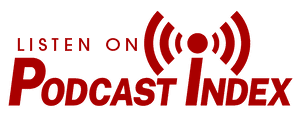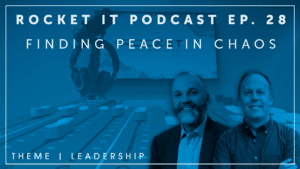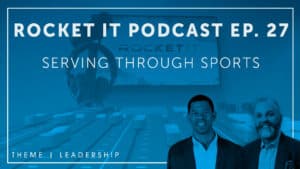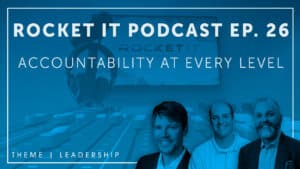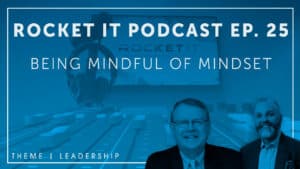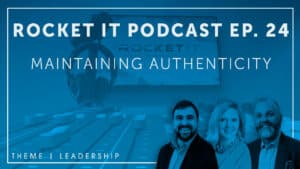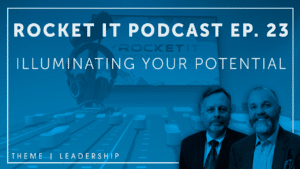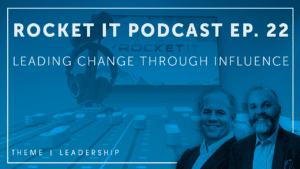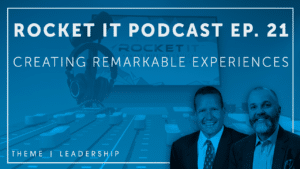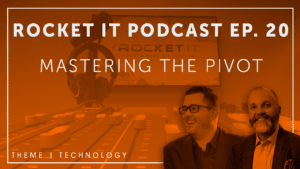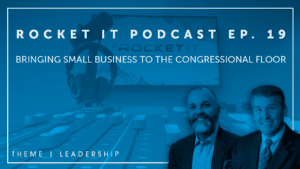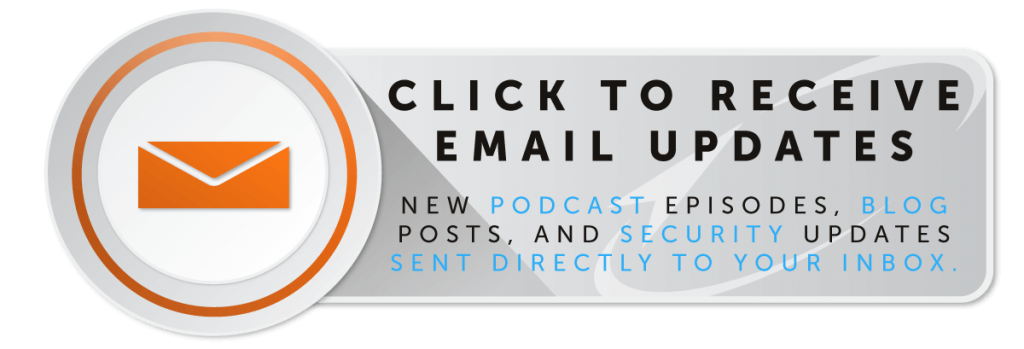
Rocket IT Business Podcast | Dan Frey | Know Yourself to Lead Yourself | Ep 2

Do you know yourself well enough to lead yourself? Are you truly aware of what drives your ambitions? Do you fully understand your role within your team? In this episode of the Rocket IT podcast, we sit down with Dan Frey, Founding Partner of a global company dedicated to liberating the leaders of today, whilst simultaneously raising the standard of leadership for tomorrow.
Having spent over 15 years working within notable corporate businesses, such as Xerox, Office Max and Boise Cascade, Frey quickly learned that leadership teachings are useless without meaningful applications. Using this framework as a platform for innovation, Frey and his colleagues worked together to establish GiANT Worldwide, an organization committed to improving the productivity of companies through the intentional apprenticeship of its leaders. Through the implementation of simple, yet memorable, tools, GiANT Worldwide provides said leaders with the foundation to both promote healthy work cultures and build important relational dynamics between team members. While the curriculum GiANT Worldwide uses to achieve this goal is quite expansive, the topics of this discussion focus primarily on the use cases of Myers Briggs testing and the importance of finding your active voice.
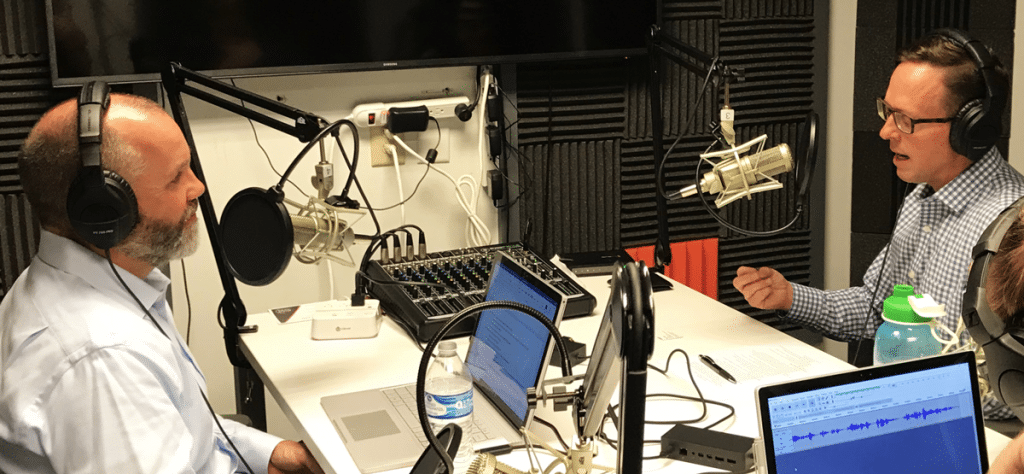
In This Episode, You’ll Hear More About…
- A brief history of how Frey assisted in the launch of GiANT Worldwide
- The key concepts behind Myers Briggs and the Five Voices assessments
- How acknowledging your personality and voice can help you better adapt to situations, understand others, and work as a team
- How to effectively use Myers Briggs and the Five Voices assessments in recruiting efforts
To remain up-to-date on topics pertaining to technology, leadership and business, follow us on Facebook, Instagram and LinkedIn. Additionally, to receive podcast updates directly to your inbox, subscribe to the Rocket IT newsletter at https://rocketit.com/newsroom/.
Resources Mentioned
- https://www.giant.tv/danfrey
- By using this link, you will receive a month of GiANT TV, free of charge.
For More Information
GiANT Worldwide – dan.frey@giantworldwide.com
Rocket IT – marketing@rocketit.com
Guest:
Dan Frey, Partner at GiANT Worldwide
Host:
Matt Hyatt, Rocket IT Founder and CEO
Show Notes
Matt Hyatt (00:00):
Do you know yourself well enough to lead yourself? Are you truly aware of what drives your ambitions? Do you fully understand your role within your team? Hello and welcome to a Rocket IT podcast focused on self reflection and some helpful steps to assist in defining your leadership qualities. I’m your host Matt Hyatt and today we’ll be speaking with a special guest from a global company that’s determined to raise the standard of leadership around the world
Intro music (00:26):
[music playing].
Matt Hyatt (00:41):
Well, this episode will provide you with insight into some of the tools industry leaders are using to examine themselves and their team’s dynamic. Know, that this is just a brief overview of the topic. Therefore, for those of you that wish to delve more deeply into these tools, we encourage you to check out giantworldwide.com. Additionally, if you should have any questions about today’s discussions, please feel free to contact us at marketing@rocketit.com or send us a message via any of the social media links found in this episode’s description. With that said, I’d like to introduce you to a dear friend of mine, Dan Frey, as a partner at GiANT Worldwide, Dan and his team attempt to liberate leaders from industry sectors across the spectrum by providing these leaders with simple yet memorable tools, GiANT hopes to change the leadership culture of these organizations for the better. Through GiANT’s efforts, participants and their programs are given a foundation to both increase productivity and better foster important relationships because the curriculum GiANT provides is quite extensive and then depth. We’re going to simply focus on two topics today, Myers-Briggs testing and the importance of finding your active voice. Dan. Hello and welcome from myself and listeners alike. We greatly appreciate you joining us today
Dan Frey (02:01):
Matt, it’s my pleasure. So it’s an honor to be here. Thank you for having me.
Matt Hyatt (02:05):
Absolutely. Now let’s dive right in. Dan, I’d love to tell a little bit of the story about your career at GiANT, how you got started. Tell us a little bit about yourself. Let’s start at the beginning. You started in corporate life, right?
Dan Frey (02:17):
Yeah. I had a corporate background right out of college. I spent the first 10 years of my career with Xerox as a color product manager. Okay. And what does that mean at color product manager? So back in the early nineties, majority of the world wasn’t really printing in color yet, and those types of products were very important to Xerox. So my role inside Xerox was to own responsibility for taking that product to market through our channels as well as our corporate salespeople. So I overlaid 70 agent sales reps for Xerox across the state of Georgia. Wow. And it was some of the best times in my career.
Matt Hyatt (02:57):
I bet. Now is that code for you were a salesperson or is that a code for you are leading salespeople?
Dan Frey (03:05):
So that’s part of my whole story because if you’d asked me this 20 years ago, I would’ve said I was a great salesperson. Yeah. I’m part of my whole journey, which we’ll, we’ll get to a little while. But it wasn’t the sales that was filling my bucket. It was the leading the people. I didn’t know that at the time. I think that’s what made me make me good at it.
Matt Hyatt (03:25):
Well Xerox is sort of known, but particularly that time for being a sales machine and they had a lot of structure around their sales program. Did they have the same thing around the leadership aspect of sales? So leadership was always boiled into their training. A lot of times they would ship us off to Virginia to a place called Leesburg where it was this thousand plus acre compound where we were usually taught everything we knew and leadership was not ever directly taught, but it was always intermingled in with the sales training. So it was a great foundation for me.
Matt Hyatt (04:03):
Fantastic. But tell us about Greenlight understand the after the corporate life maybe moved on to something different.
Dan Frey (04:12):
Well, so yeah, there was, there was, I left Xerox in the early 2000’s worked in small business for a little while. Left that, went back to Corporate America, worked for Boise Cascade was now acquired Office Max and was there for five years. But really it was, felt like something was always missing. And I thought what that was, was starting my own business. So in 2008, I started Greenlight communications, which was a a digital printing business and the focus of Greenlight was to do a digital print services for the human resource and training executives. And that was really the way we kind of structured our, our marketing game plan and really focused who we went after was HR executives and training directors.
Matt Hyatt (04:57):
2008 perfect time to start a new business, right.
Dan Frey (04:59):
Not only that, a new business and a, a commodity of printing business, right. So I thank my wife regularly for hanging through those shots because there was a lot of practical data in the moment that said that shouldn’t have happened, but I ignored it and and it worked out. It worked out very well.
Matt Hyatt (05:20):
Well, that’s kind of the entrepreneurial way, right? To sort of understand what the risks are and then to ignore them and press on.
Dan Frey (05:27):
The gut instinct many, many times overrides information.
Matt Hyatt (05:31):
Fantastic. Yeah. So tell us about GiANT Worldwide. How did you get plugged in there?
Dan Frey (05:35):
Well. So it’s hard to kind of go there without kind of going into my whole story, which I won’t go into. But in short I was always looking for the next thing. Like I was never satisfied. Corporate America was not satisfying enough and I thought what would be satisfying is starting my own and making, making it successful, which I did in Greenlight. Yeah. We made a very successful in under three years. I did realize that print was not going to, I, in my opinion, I thought print was going to die before I was ready, you know, kids getting ready to go to college. So we started another business to compliment print. I got into the marketing space, digital marketing with some brilliant Georgia Tech kids. And the idea behind that company, it was called Craze at the time, was that it was going to produce opportunity that would compliment print. It was going to be both and. And so the way GiANT kind of came to be was I asked Jeremy Kubicek, the Founder of GiANT, really just to have coffee. He and I had befriended each other on the football field or boys playing football together.
Dan Frey (06:45):
And I really thought he was going to give me basic business advice. But what happened was he and I ended up meeting at a coffee shop in John’s Creek here in Georgia for a year. And it was collaborating around business and leadership. It was a long coffee date and it was really the guy who was one of the main leaders of my life. It was him really kind of helping me figure out what was the combination of objective as well as fulfillment for me. And it just so happened that what he was working on was what I was looking for. That was what GiANT was. So our version of GiANT was started almost seven years ago, GiANT Worldwide. And he voiced some of the vision of what that was going to be to me. And I’m like, I want it. And so I had to go home and say, all right, Audrey my wife, here’s going to be another business we’re going to start.
Dan Frey (07:37):
She stuck with me through that one. So that was at the beginning and GiANT celebrated, really, it’s sixth anniversary in terms of actually going to market this past January. But I always say I’m in my seventh year because I was think tanking it with Jeremy for a year before it really got rolling.
Matt Hyatt (07:54):
That’s really fun. Yeah. So today still running Greenlight and working with GiANT also?
Dan Frey (08:01):
Yup. Yup. Greenlight still exists. I mean, print kinda just does itself. I have an amazing business partner. It and my printing company and then Jim Perez he’s another guy like that. I’d say top 10, and people in my life that have really helped me be what I am. So he kinda makes all that happen for us and and 99% of my time is GiANT.
Matt Hyatt (08:21):
Wow. Fantastic. Yeah. Yeah. so let’s dive in a little bit to some of the things that you’re talking about when you’re working at GiANT. And one of the things I hear the most about is the Five Voices. Tell us about that. What, what do you mean when you’re talking about the Five Voices?
Dan Frey (08:37):
Well, one of the most effective pieces of content that we at giant worldwide have built, and it was really architecting between Jeremy and Steve Cochran, our cofounder, was that we believe that every, every leader, every person has a voice out there. But only some people are really heard. Hmm. And ironically, the wider percentage of the population are the ones that aren’t heard. Hmm. And the smallest percentage of the population tends to be heard the most. So the five voices, we would say that there’s an any given time, five voices inside a team or there should be a pioneer, The connector, a guardian, a creative or a nurture. Alright. And the majority of the population is made up of the guardians and the nurturers.
Dan Frey (09:24):
I see voices that tend to be heard the most though are the connectors and the pioneers.
Matt Hyatt (09:29):
Ah. So when you talk about that, you know, you’re saying people aren’t heard, what do you mean exactly?
Dan Frey (09:36):
Yeah. So you have to kind of break down each voice for what it’s gifting. Yes. Okay. So if I started from the voices that are heard the least and go up to the voice, that tends to be heard the most. The one that’s heard the least, and they tend to make up about 43% of the population has the nurturer voice. This is the voice on the team that is like the the champion of people. So if there’s ever vision being cast inside the organization, the nurturer is that voice filtering that vision through, okay, how’s this going to impact people that I work with and they’re the ones that are going to be a little bit more resistant if that vision is not really thought through, not because they are not bought into vision, but they’re very protective of the safety of the people on the team.
Dan Frey (10:24):
Hmm. Many times they may be found in HR, they may be found in roles that are directly customer engaging because they really do choose to do a job because they care. Right? That’s that nurturing voice. Second voice that is least heard is the creative voice. These are the raging futurist voice that are always thinking of the next possibility that the organization could do. Many times the creative feels like they’re the voice that always speaks but is rarely understood so many times it’s because they are voicing a vision that is so far out there that it’s very difficult for them to break it down to the practical pragmatic reality. The here and now, so many, many creatives feel like they’ve voiced an idea that has never heard. And then six months later somebody else voices the same idea and everybody says, Hey, great idea. And the creative is like, well, wait a minute. I said that months ago and everybody says we didn’t hear it. So that’s the frustrating. Yeah, that tends to be me. That’s my first voice is the creative. So a, the third voice would be the guardian. Okay. So the guardian voices, the voices, the, the steward of process, system, deliverability, quality, execution. This is the voice inside of an organization that supports all of the systems and processes. Many times they’re in the accounting or the operation roles. I’m not saying accounts and operations people are all guardians, but that tends to be the voice that thrives in those roles. Wow. These are the ones that, where the nurture may be protecting the people. The Guardian’s going to say, I’m not moving forward on your vision until you prove to me how it’s gonna fit into the current processes or the here and now. So the guardian is the one that honors the past as well as looking into the future.
Dan Frey (12:18):
Gotcha. The next voice is the connector voice. So if you have a sales team, this is the voice you want on your sales team. These are the people that are their future driven, but they’re also very emotionally connected to what they do. So if they are bought into what they’re selling, they can, they’re very effective at swaying people toward something that they believe in deeply. Right. They’re also that they tend to be that voice. That’s the, I got a guy voice. So they tend to have a connection for everything. You know, if you’ve ever known somebody out there that you know, if you need a plumber, well I got a guy, you know, they got a guy for everything that might signal that they have that connector voice inside the work world as well. And then the last voice that tends to be heard the most is the pioneer.
Dan Frey (13:01):
And these guys were very predominant in CEO roles. These are the ones that are strategic military thinkers that can see a vision and align people, systems, resources, money to make that vision happen. Highly competitive, highly competent, highly credible, but they only make up about 7% of the population. But they tend to also be. That sounds like that’s a good thing. Yeah, it is. It is. So if you, if you go out on the street and look for a pioneer, you’re probably not going to find them that often. But if you go into the C suite of any major organization, they’re probably easy to find because many times that’s the voice in that leadership role in driving the whole machine. So that’s our, our five voices class.
Matt Hyatt (13:44):
That’s fascinating. You, you kind of talk through those and I can identify a little bit with all of them. You know, I could really identify a little bit about caring about people and certainly identify with being sort of the future oriented creative type of person. And then you could probably get through the list, the guardian really placing a high importance on systems and processes. So is it possible somebody who has more than one best? That’s a brilliant question. Absolutely. Well thank you. I come up with that one on my own.
Dan Frey (14:19):
Quite frankly when we’re out there in the trenches, that’s what we help people understand. So you have five voices and at any given time you are a little bit of all five. Absolutely. That’s where I get passionate about what GiANT does. Cause I think a lot of times assessments that are out there nowadays try to pigeon hole people. We absolutely don’t do that. You know, if I put it on me, I tend to be the creative connector, nurture guardian pioneer. That is my voice order. And so where I am most effective or most alive is casting vision and then bringing things together to make that vision happen. Similar to a pioneer. But where I differ a little bit is that much more of a depth approach. Creatives tend to be a little bit deeper in their vision. So I’m much more likely to start small businesses. Pioneers are much more likely to start a business and take it galactic. So it’s subtle differences a little Rocket reference there. I like that. There you go. So but the thing is you are absolutely in any given time, a little bit of every voice. I mean, every single parent has to be a guardian, right?
Matt Hyatt (15:27):
So, you know I’m remembering back to when I first moved by business out of the house and then, so an office for the first time, we have the budget for a single office with two desks. And so the very first person that I hired sat directly across from me. Uh just like you and I are sitting in a room together now at the same, same table. And I’m imagining that her voice was probably pretty different than mine back in those days. So how do you, how do you work through that when you have different personalities trying to work together? Either in the same team or maybe even two people working closely together and have different voices. Is, is there some pitfalls there that people need to work through or how does that work?
Dan Frey (16:15):
So it doesn’t, and it should. I think that’s part of why GiANT is growing so fast because that’s exactly what most people need. A creative needs a good guardian. Many times pioneers need a good nurture. So, but the problem is those voices tend to clash and not value each other so much. So if it’s a startup, A lot of times it doesn’t work because they don’t realize or appreciate the gift of the other voice. That’s where we are really helping people understand that every voice is gifted and actually having certain voice combinations that offset the weakness that we have is really the secret. So my business is up over 50% this year. And I think one of the smartest decisions I made last year was to invite a guardian to join me and actually share my business with me. And because of our, our partnership approach to delivering this in a major fortune 500 company, we scaled the business actually inside that organization, 200% so had I tried to do it myself as a creative voice, I had the vision of what I wanted to do, but I am not the implementation guy. I’m the vision guy. Got it. So I went out and looked for the implementation guy to take my vision and translate it into how we execute at the highest level.
Matt Hyatt (17:39):
Got it. So Dan, you’re talking about a startup and maybe having two or three people in the room and how there might be a breakdown if the voices are different than you, it doesn’t work, you know, those, those different voices trying to maybe compete for attention or priority in the business with people being heard. But he also alluded to, as the business grows and gets bigger, that’s probably a value in having all the voices represented. Did I hear that correct? Absolutely. So let’s talk a bit, a little bit about bridging the gap there and then we’ll move on. But how do you do that? So if, if I’m a creative and I think I am should I, you know, the day one hire another creative and another one or is it smarter to use or be on the lookout for folks that might be able to contribute differently? You said with your business partner, you sought out a guardian of imagining someone who’s sort of future oriented and a kind of a pie in the sky kind of person versus someone who’s super detailed and process oriented. Could be oil and water or it could be the perfect fit, you know, how do you, how do you walk through that?
Dan Frey (18:50):
That’s a great question. I mean it’s really understanding where each voice thrives. If you look at the guardians and the nurturers, they tend to be the present oriented voices, much more the voice that can embrace the details and look at the, you know, the here and now, much more implementation type voices, guardian, a nurture one for people, one for process. You look at the connectors, the creatives and the pioneers, they’re the future oriented voices. You know, it’s almost like if we want to say dreamer versus doer, pioneers, creatives, connectors, they’re always future oriented, always thinking about the next big thing. So if it depends on the stage of the organization as well. So if it’s a startup your pioneers, your connectors and your creatives are gonna thrive in the startup phase, the nurtures and the guardians. It’s not that they couldn’t play there, but it’s going to be a bit more challenging for them because they’re not, the structures haven’t been built to give them the clarity on how we execute. If things are constantly changing, they may struggle. Now we believe and we have a, a principle that we teach called Pass the Baton where we help organizations kind of understand what stage of their life cycle they’re in. And I’ve even got some fortune fives that I work with that in some divisions of this organization, they see themselves as falling back to a startup even though they’re a public fortune 500 company. So when that happens, the voices that come alive are more future oriented. The voices that struggle are more present oriented. So w when eventually has to happen in all organizations is an establishment phase or an establishment lifecycle where the details, the systems and the structures are built that actually create the platform for growth.
Dan Frey (20:37):
Your present oriented voices, your guardians, your nurtures, they’re going to thrive there. And for me, when I said I brought in a guardian, that’s where I was a year ago because you know, we were a good five years in really rocking and rolling at GiANT. But I realized that my voice, the, the limitations of my voice being a first voice creative or an implementation, not vision, right? So I can dream it up, but if I have to implement my capacity to do that is not as strong or wide as a guardian. And my business has scaled to the point where my capacity to manage the details of the business was maxed. So if I wanted to say, well, I just got to work harder, I increased my chance that I burn out. But if I say I want to invest in somebody else, it actually created return on my investment by saying, Hey, I want to share my business with a guardian because they’re bringing gifts to the table that I don’t have. Basically what happened is we did more business.
Matt Hyatt (21:40):
Wow, that’s great. I love how that works out. Sounds like one plus one can equal three.
Dan Frey (21:46):
Absolutely. Perfect. Perfect analogy.
Matt Hyatt (21:49):
Fantastic. in the past we’ve talked about five voices and they can be particularly helpful discussing team dynamics and it sounds like that’s what we’re really talking about here. Does this scale up to those larger organizations? You know, when you’re talking about hundreds of people is there some balance there? You mentioned, for example, I think you said 43% of the population is a nurturer. So if I’ve had a hundred person organization, you’re saying that I’ve chosen randomly probably 43 of them, our nurtures, but is there, I don’t know, is there some structure there that you should be seeking out or is it more of just understanding what you’ve got and working in some of that?
Dan Frey (22:33):
Another great question. So when I look at your business, Matt, I mean IT, you know, if you were choosing randomly, I wouldn’t think in the IT space and this is a little stereotypical, but I wouldn’t gamble that nurtures are flocking to the IT space. I might gamble that creatives, right? Technology based type personalities, creatives, maybe pioneer connectors, future-oriented voices. A lot of them are leveraging technology to do great things. They see possibilities of how to use technology. I might almost say that in the it space you might find the smaller percentage just by the nature of what your business is. But if you’re a fortune 500 company, I think you’re much more likely to attract any or all voices. So if you did select randomly, you’re probably going to get more candidates that are nurtured guardian just because they represent the wider based of the population.
Dan Frey (23:30):
So when you said is it something that can scale, that is absolutely what we see with the voices and why we’re so excited about it and what we’ve already seen happen. Cause we go into team dynamics and we help each person, the team understand what’s their most natural voice is. Hmm. And maybe even more importantly like if we have five voices, it’s not as important in my opinion to understand what your top two are. It’s really important to understand what your bottom two Oh yeah, because that’s where your struggle is. Sure. So you know, I know that pioneers and guardians are going to be my bottom two, so if I want to offset my liabilities as my business scales, those are always going to be my areas of opportunity to bring people in.
Matt Hyatt (24:19):
But those voices can be developed, right?
Dan Frey (24:21):
Absolutely. Absolutely. So you know, I’m a coach so I have to be competent and credible and coaching any voice. Gotcha. Which is a pickle. I mean that’s really what I try to help everybody do because as a creative, my liability is typically not building a chemistry or being seen as a man of strong character that usually just naturally comes out of creative voices. We’re so future oriented that our risk is that when we speak, what’s coming out is not resonating with people in the present. And a lot of times, even though we may have all the competency in the world, it dings us in that area because we don’t seem to know what we’re talking about because we don’t make any sense when we speak. So the point of it all is you, I always tell my clients, you have to be well versed in all five. It’s situational awareness basically as what I teach, so that if there’s a nurture on the other side of me, what do I have to do about me to maximize connectivity with that nurturer?
Dan Frey (25:27):
There’s a pioneer on the other side of me. What do I have to do about me to maximize connectivity of that pioneer? Right. And that is where every individual that I work with, the opportunity becomes very personal for them. Sure. Because they’re the only one that’s lived their life. They’re the only one that has that base of experience. So when they realize these are my limitations, it’s up to them to develop their own. Just like you said abilities in their weakest voices, but it’s on them to do that. We can help them. Right. But at the end of the day, it’s all about their execution, not their awareness.
Matt Hyatt (26:05):
Got it. So one thing I’d like to dig in a little bit on Myers-Briggs type indicator NBTI I know that you’re a certified practitioner for NBTI. Yes. I’d love to hear a little bit about whether that’s a tool that you still use. And if so, How?
Dan Frey (26:23):
Absolutely. back in the very early days of GiANT many of us went out and got Myers-Briggs certified because we, that was our platform to coach somebody one-on-one. Got it. Okay. So what I still use the Myers Briggs for on a very regular basis is if I do a, what we call a leader intensive at GiANT Hmm. Where it’s more of a deep dive one-on-one with a leader. It has four stages to it. So if I ever do this one on one, I’m helping a leader understand, okay, how do you tick, what is your natural wiring? That’s stage one. Stage two is what is your preferred future? Hmm. So where do you, where do you really want to go right inside your organization, but outside your organization as well, especially if you’re the CEO, you know, what do you want from your company? But what do you want for your company? Stage three is kind of an assessment then because I’ll take how they’re wired and where they want to go, and then we’ll look backwards to see what tendencies have them where they are. And I can leverage young and typology and Myers-Briggs to look for patterns in that leader and basically give them the awareness of what they need to be doing more of and less of, to really get the preferred future that they want. And then stage four as they build their own action plan.
Matt Hyatt (27:41):
So digging into NBTI a little bit more, sounds like it’s very useful and doing these leader intensives and sort of doing a deep dive. Can you tell us a little bit about what you look for there in a, in a leader as an example? Is there a particular Myers-Briggs type that is important in terms of leadership qualities or some other way?
Dan Frey (28:06):
No. I think all types have their gifting. Every type can be a leader. There are statistics that might show certain types tend to hold more what we would call in our culture leadership positions. I’m starting to not even like the word leadership. It’s very saturated and watered down and vague. And I believe if you have a heartbeat and one friend, you have the opportunity to be a leader because you have the opportunity to have influence. So every voice or every type is got its own sweet spot. So where leadership can really kick in is understanding that sweet spot and maximizing that gifting as you leave. So but what we’re looking for when we look through the Myers-Briggs, and I’m sure many of your listeners are aware of Myers-Briggs, is it’s probably the oldest instrument out there in terms of assessments. I think it has the most credibility for that reason.
Dan Frey (29:04):
It’s got the most data backing it because it’s been around for, so there’s a lot of other instruments out now that are very popular, but I really, really tend to favor the Myers Briggs, but I don’t use it to stereotype somebody or pigeonhole somebody into four letters. Sure. I help them use it to say, huh, if there is 16 types, which one am I most like and can I use that language to actually see my tendencies in a way that helped me be more proactive or intentional around shaping my behavioral patterns to have better results. So there’s four dimensions to young and typology or Myers-Briggs. There’s extroversion versus introversion, which is the preferred way of getting energy sensing versus intuition, which is how we see the world or how we take in and process information thinking versus feeling, which is how we tend to go about making a decision and then judging versus perceiving, which is just our preferred lifestyle combinations of those four letters make up the 16 different types and each type has its own tendencies as a leader.
Matt Hyatt (30:12):
Wow. It sounds like you spend an entire podcast. Just on that topic, let’s, let’s talk a little bit about, you said both when talking about five voices and how that plays and the role as of team building, but also in these leader intensives using Myers-Briggs and five voices. It sounds like there’s a lot of self reflection in there. And I’ve heard you say before, and I know GiANT says this a lot, this phrase, know yourself to lead yourself. Can you tell us a little bit about what that means or what are you talking about?
Dan Frey (30:43):
Well, so in the nature of the way you asked the question, I’ll try to pull in a little bit of Myers-Briggs and a little bit of voices and apply it to like a real title. Okay. So a lot of the pioneers that we find out, they’re in the five voices content. They probably tie back to that of being an intuitive thinker. So from Myers-Briggs, so that’s N T in the four letters, right? So that’s a visionary. It’s a big picture. I take in information and I’m always looking for what it could mean or what the possibility could be. And then I make decision in a logical, impersonal way to actually achieve that vision and team. That’s very quick, basic Myers-Briggs, you stuff that tends to be what pioneers are. So if you’re an E, N, T P for instance, you have a lot of energy from the external worlds. You love being around people, things, ideas, collaborating. You’re a visionary personality that makes logical decisions and you do life with your options open. That tends to be very much a pioneering entrepreneurial risk taking type personality and the five voices language that fits pioneer very well. So if it goes back to know yourself, to lead yourself, if I’m in a leader intensive and I help a ENTP realize, wow, that is my tendency and I probably do identify with the pioneer voice, okay, what is the sweet spot around that? Or what is the blind spot around that? So the sweet spot is you’re a starter. You could probably think of something that no one’s ever thought of and actually put it into play. But how many people follow you because they want to versus because they have to, right? ENTP pioneer types many times are the very strong, maybe dominating type personalities get results, but there might be a lot of blood in their waiting and so they’ve gone through people to get those results if they’re not aware of it.
Matt Hyatt (32:38):
So usually when we hear terms like leadership, maybe not one of your favorite terms anymore. You almost always hear that though. In the context of leading others, why is it important to really kind of look in the mirror? Is that a necessary step in order to be an effective leader? Does everybody need that?
Dan Frey (32:57):
I think so. I think the greatest miss in leadership is self-awareness. I mean if you, if you’re oblivious, I mean Steve, our founder, one time I heard him say no one ever graduates from the school of self awareness. And I said, well, in my opinion, very few ever enrolled. So if we never know what it’s like to be on the other side of us, we’re basically leading an accidental life or, We’re leading from an accidental platform because we’re looking at the world through our own lens. We’re never considering the lens of the people that work for us. So if you get results, great, you got results. But what did it take to get to those results? And being valued as a leader, you know, if you think of the best leaders you’ve ever worked for, and I do this regularly in my sessions 100% of the time, I hear somebody describing a leader that knew them for who they were, but also challenge them to be what they could be. Hmm. So it was, it was both. And it wasn’t just, Hey, I’m challenging you to get to the objective, right? It’s, I understand you for who you are and I’m going to help you get to that objective. But very rarely do we see that out there. We want to hire the person with the most qualifications, get them on their quote, right seat on the bus and make them execute at a high level. So we win. But very rarely do we actually ever say, what do we need to do to actually help them get there? We just hope we hire right. And they do a good job.
Matt Hyatt (34:35):
Well, I’m glad you brought up hiring. So I want to dig into that a little bit and that you and I have discussed a little bit before. But for the benefits of our listeners let’s, let’s dig in just a bit. So you and I are about the same age and right now we are looking at the lowest unemployment environment of our entire lives, not just our business lives, but our entire lives, right? And so for a lot of entrepreneurs and business leaders that are looking to build a team, it’s a critical time. There just aren’t that many candidates out there. There might be fewer candidates out there looking for the job that we have to offer. Then there were just a few short years ago. And so we’ve got to select, well, we’ve got to make sure that we make those decisions, right? Because the environment is such that pickings are slim and we need to make sure that we make good decisions. So in the process of building a team and hiring to fill out the team positions on your organization, how do you use five voices and Myers-Briggs? It seems like sort of a taboo topic. Can you tell us about that?
Dan Frey (35:49):
Yeah, and I’ll try to be clear in the way I say it cause you made me think about a study that came out at the end of 2016 that you may remember it was done by Gallup and it was widely published that two thirds of Americans have zero connection to what they do everyday. They’re just going to work. Wow. So two thirds, two thirds. So I wonder, you know, with this, the increase in jobs in our country and the, you know, the lowest unemployment rates ever, how many of those people are going somewhere where they want to be versus have to be? Right. I think most of us tend to take a job and just go do the job.
Dan Frey (36:28):
And if nobody has this 40 hour work week anymore, you know, to say you work 60 hours is not a badge of honor. It’s like, yeah, you should. All right, so everybody’s doing that. So you know, if you’re, if you’re working 60 hour work week and sleeping eight hours a night, you know, half your life, you’re either asleep or disconnected if you don’t like what you do. So to answer your question, like how would you maybe use Myers-Briggs or five voices and my opinion, if I’m hiring, I’m looking for somebody that is really in alignment with what we do. I think that relational skills are becoming more and more and more needed in our culture and actually understood that that has to happen. To be the most effective. It was usually let’s get the people that’ll achieve the objective. Now it’s like, well they don’t want to be there, How effective will they be? So if I’m hiring, I want people to understand my culture and I want people to understand my team. I want people to understand, Hey, this is what we’re about and this is who we are cause we want you to want to be here, right? We don’t want you to take a job. We want you a year after you’re hired to be okay with it being Sunday night and you’ve got to come to work on Monday morning. So if you’re using Myers-Briggs or five voices to hire, the way I would frame it or position it is just that way. Like if you’re very much a Myers Briggs company and I think Rocket likes to use the NBTI, the Myers Briggs, you know, Myers Briggs would tell any practitioner to say it should not be used as a condition of hiring. Right?
Dan Frey (38:06):
And I would agree with that, but I’ve seen some organizations be very clear and open with the candidate. This is why we do what we do. Here is what makes up our organization. We’re not saying you have to be that, but we want to understand you and we want you to understand us. And they’ve actually taking candidates through a tight validation. So, in essence, even if the candidate doesn’t get hired you’ve given that candidate a greater level of self awareness. It’s like almost like a wow. They were considering hiring me and they poured into me through the hiring process. It kind of demonstrates something about that organization that, that I would want to be a part of. I’ve seen organizations do that. Five voices might be a little bit more effective in that area. But again, I would not say use as a condition, right?
Dan Frey (39:00):
So you can’t say, Hey, we need, right. Right. Like we need a guardian. So let’s go hunt guardians. That’s just anybody can be in do anything. As we said earlier, you’re a little bit of all five voices, right? But to actually say we’d love you to take this assessment, we’d love to talk to you about our methodology of understanding each other inside our organization through the lens of the five voices. And as such, we’d love to know how you see yourself, just so you understand us. As much as we understand you. I think that is a great way to use it, the instrument.
Matt Hyatt (39:38):
I love it. I often talk with my team about interviews as opportunities for experience. So from the moment that we make first contact with a candidate that’s applying for a job, an experience begins when you’re creating an imprint in their brains that they’ll remember and you want that experience to be a positive one. So I liked the idea of using some of the tools to maybe focus in a little bit on who they are and who we are. That’s what an interview is, right? It’s a bi-directional evaluation. It’s not just us trying to figure out what we like a candidate that it’s the candidates opportunity to meet people on the team and learn a little bit about the organization, what they might be getting themselves into. And so I like the idea of incorporating Five Voices or Myers-Briggs into the process just to get to know one another. But I agree we would stop short of using either of those tools as a filter. I think that’s important. Well, fantastic. Dan, I’ve really enjoyed spending some time with you. I’d love for our listeners to know a little bit about how to reach you and learn a little bit more about the Five Voices. Tell us how, how can our listeners learn about the Five Voices?
Dan Frey (40:54):
Well, probably one of the best ways. I mean, we have an amazing resource that we’ve built out in the last year called GiANT TV. They can actually access GiANT TV and watch the Five Voices as if it’s a, it’s a video series. So that is a very easy, quick way to learn about it. And the, where they could go is giant.tv and if they do forward slash Dan Frye, D a, N, F, R, E, Y, they can play around on giant TV for 30 days and watch all about the five voices right there. It’s probably the best platform to actually learn about some right out of the gate. Awesome. And how can people find you? So absolutely, they can always email me at Dan dot fry F R E Y. It looks like fray, but it’s fry. So Dan.Frey@Giantworldwide.com.
Matt Hyatt (41:43):
Got it. Fantastic. And with that, I think it’s time to wrap up what’s been a truly insightful discussion, Dan, for myself and our audiences near and far. We want to say thank you for spending time with us today.
Dan Frey (41:57):
Very much enjoy it. Thank you for having me.
Matt Hyatt (41:59):
To everyone listening, Thank you for tuning in. We hope this segment has encouraged you to both embrace your key strengths while taking the time to reflect upon how you can improve any secondary traits. Once again, please understand that this discussion has been the brief overview of Myers-Briggs and five voices assessments. If you wish to delve more deeply into these tools, we encourage you to check out the plethora of information available on giantworldwide.com additionally, if you should have any questions about today’s discussions, please feel free to contact us at marketing@rocketit.com or send us a message via any of the social media links found in this episode’s description and the meantime, dream big, thrive on.










